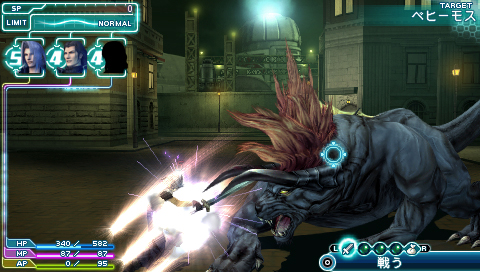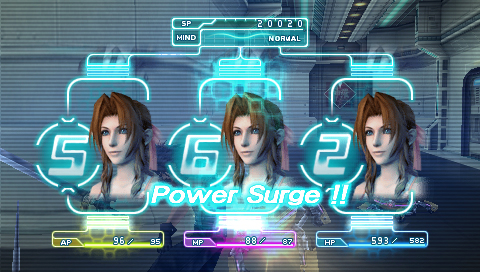he original Final Fantasy VII was one of the primary reasons why I purchased a PlayStation back in 1999 — I'd been introduced to console RPGs a year prior with Chrono Trigger on the SNES and couldn't wait to see what 32 bits and multimedia brought to the table. As you might imagine, I wasn't at all disappointed by Cloud and company. However, the FFVII spin-offs which have been trickling out over the last year in celebration of the original's tenth anniversary have been, at best, mediocre. Though gamers had the highest of hopes for the recent PSP release, Crisis Core: Final Fantasy VII, most weren't holding their breath.

Half action, half RPG, all Final
Fantasy.It's hard to put a label on Crisis Core's gameplay — although (graciously) not an attempt at action like last year's Dirge of Cerberus, this title's near real-time combat makes it difficult to label it a traditional role-playing game either. Players take control of Zack Fair as he rises through the ranks, beginning as a mere Soldier Second Class and eventually becoming a "hero." Although Crisis Core won't be remembered as one of the greats in the Final Fantasy franchise, it does introduce some interesting new play mechanics and features a structure that's perfect for portable play.
Much like the game on which it's based, customization in Crisis Core arrives in the form of Materia. These crystal baubles come in every color under the rainbow, and possession grants their holder everything from access to spells and abilities to stat increases. As Zack levels up with experience, so to do the Materia he carries. There's no set formula for equipping your character, and the options are numerous indeed — specializing can be powerful, but a lot can also be said for a balance of abilities. Certain enemies are more susceptible to physical attacks, whereas others are highly vulnerable to a particular magical element. Only through trial and error will one discover these weaknesses — don't be afraid to experiment with a variety of different Materia.

The DMW: you don't level up without it.As for enemies, I'm afraid Crisis Core is more of an "old school" Final Fantasy game — practically every encounter is random, which might turn some players off following FFXII's distinctly non-random system. Still, most battles are quick thanks to this title's near-real-time combat. Unlike other FF games, players are able to take direct control of dodging and blocking using face buttons. Although there is an action queue for physical attacks and spells, waits are usually quite quick — there's definitely the illusion that one's playing an action game rather than an RPG despite Crisis Core's relatively deep character customization.
One of the biggest changes this game brings with it is its leveling system. The Digital Mind Wave (DMW) is a spinning roulette wheel which governs everything combat related, from special attacks to Zack's leveling up. The three wheels that make up the DMW function with complete randomness — though its effects are interesting, there's little players can do to shape its outcome. As frustrating as it can be to not see experience displayed numerically, I actually began to appreciate that little dash of the unknown which the DMW brought with it. It was always a pleasant surprise to see Zack level up at a time you least expected.
Side quests return in a big way in this Final Fantasy — much like in FFXII, players will find that they're rewarded quite well for taking on these jobs. Sadly, side quests aren't implemented into the main storyline very well at all. Rather than have the job board, the developers at Square Enix have simply included a "jobs" submenu which is accessible at any of the games frequent save points. Though this makes grinding easier, it does little to bolster Crisis Core's sense of continuity. I appreciated being able to play through one of these missions when I only had a few minutes of playtime at my disposal. Still, it's a shame that they aren't better implemented into the main quest considering how much time players will spend with them.
I'm a little bit sad to see Crisis Core labeled as a FFVII game. A lot of the gameplay that's presented here is fresh and interesting, but that's bound to be overlooked by those seeking the "perfect" prequel to Cloud's 1997 adventure. Still, even if you're not totally satisfied with this game's presentation or the way its story unfolds, this is undoubtedly the way RPG's should be done on the PSP. Crisis Core's numerous chapter points and compartmentalized encounters mean that it can be played in short spurts — perfect for that morning commute or a quick gaming binge during lunch hour. Until the original Final Fantasy VII is reimagined on the PSP (I'm still crossing my fingers for that one), Crisis Core and its refreshingly unique gameplay should tide us over.









































